The sudden death of 14-year-old Miller Gardner, son of former New York Yankees outfielder Brett Gardner, has brought to light the potential dangers of carbon monoxide (CO) exposure in hospitality settings. The incident occurred on March 21, 2025, during a family vacation at the Arenas Del Mar Beachfront & Rainforest Resort in Costa Rica. Initial reports suggested food poisoning as a possible cause; however, subsequent investigations have pointed toward carbon monoxide poisoning as a more likely culprit.
Incident Overview
On the evening of March 20, the Gardner family—Brett, his wife Jessica, their eldest son Hunter, and Miller—experienced severe gastrointestinal symptoms, including stomach cramps, vomiting, and diarrhea, after dining at a local restaurant. A doctor was summoned to the resort and administered medication to alleviate their symptoms. The following morning, Miller was found unresponsive in his bed. Despite immediate medical attention, he was pronounced dead at the scene.

Investigative Findings
Initial hypotheses centered around food poisoning or an adverse reaction to medication. However, these theories were later dismissed. A detailed investigation by Costa Rica’s Judicial Investigation Agency (OIJ) revealed elevated levels of carbon monoxide in the family’s hotel room. Randall Zúñiga, the OIJ’s general director, noted that the room was adjacent to a mechanical area, which could have been the source of the CO contamination.
Hotel’s Response
The Arenas Del Mar Beachfront & Rainforest Resort has disputed claims that lethal levels of carbon monoxide were present in the guest room. A spokesperson for the resort stated that high CO levels were detected in a mechanical room not accessible to guests, while levels in the Gardner family’s room were “non-existent and non-lethal.” The resort emphasized its cooperation with ongoing investigations and expressed condolences to the Gardner family.
Autopsy and Toxicology Reports
As of now, the official cause of Miller’s death has not been confirmed. Authorities are awaiting the results of toxicology tests, which are expected to take several weeks. The OIJ has indicated that they are working closely with the United States Federal Bureau of Investigation (FBI) to determine the exact cause of death.
Impact on the Gardner Family
The Gardner family has been profoundly affected by this tragedy. In an obituary, they described Miller as an active eighth-grader who excelled in academics and sports. He was a member of his middle school’s football team and junior varsity baseball team, and he had a passion for golf, fishing, hunting, and traveling with his family. The family has requested that memorial donations be made to the Make-A-Wish Foundation in Miller’s honor.
Community and Organizational Reactions
The New York Yankees honored Miller with a moment of silence before their Opening Day game. Team captain Aaron Judge spoke about Brett Gardner’s significant influence on his teammates, referring to him as a leader and mentor. The Yankees organization and fans have expressed their support and condolences to the Gardner family during this difficult time.
Carbon Monoxide Poisoning: A Silent Threat
Carbon monoxide is an odorless, colorless gas produced by the incomplete combustion of fossil fuels. Common sources include vehicles, furnaces, stoves, and generators. CO poisoning occurs when the gas accumulates in enclosed spaces, leading to symptoms such as headache, dizziness, nausea, vomiting, and confusion. High levels of exposure can result in unconsciousness or death.
Preventive Measures in Hospitality Settings
This incident underscores the critical importance of stringent safety protocols in hotels and resorts:

- Regular Maintenance: Routine inspections and maintenance of fuel-burning appliances and equipment can prevent CO leaks.
- CO Detectors: Installing carbon monoxide detectors in guest rooms and common areas can provide early warnings of elevated CO levels.
- Staff Training: Educating staff to recognize symptoms of CO poisoning and respond appropriately can mitigate risks.
- Guest Awareness: Informing guests about the presence of CO detectors and safety measures can enhance their sense of security.
Conclusion
The tragic death of Miller Gardner has highlighted potential safety lapses in hospitality environments and the need for rigorous adherence to safety standards. As investigations continue, it is hoped that the findings will lead to improved safety protocols to prevent similar incidents in the future. The thoughts and condolences of the community remain with the Gardner family as they navigate this profound loss.

















